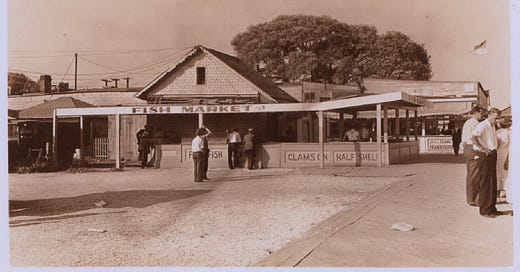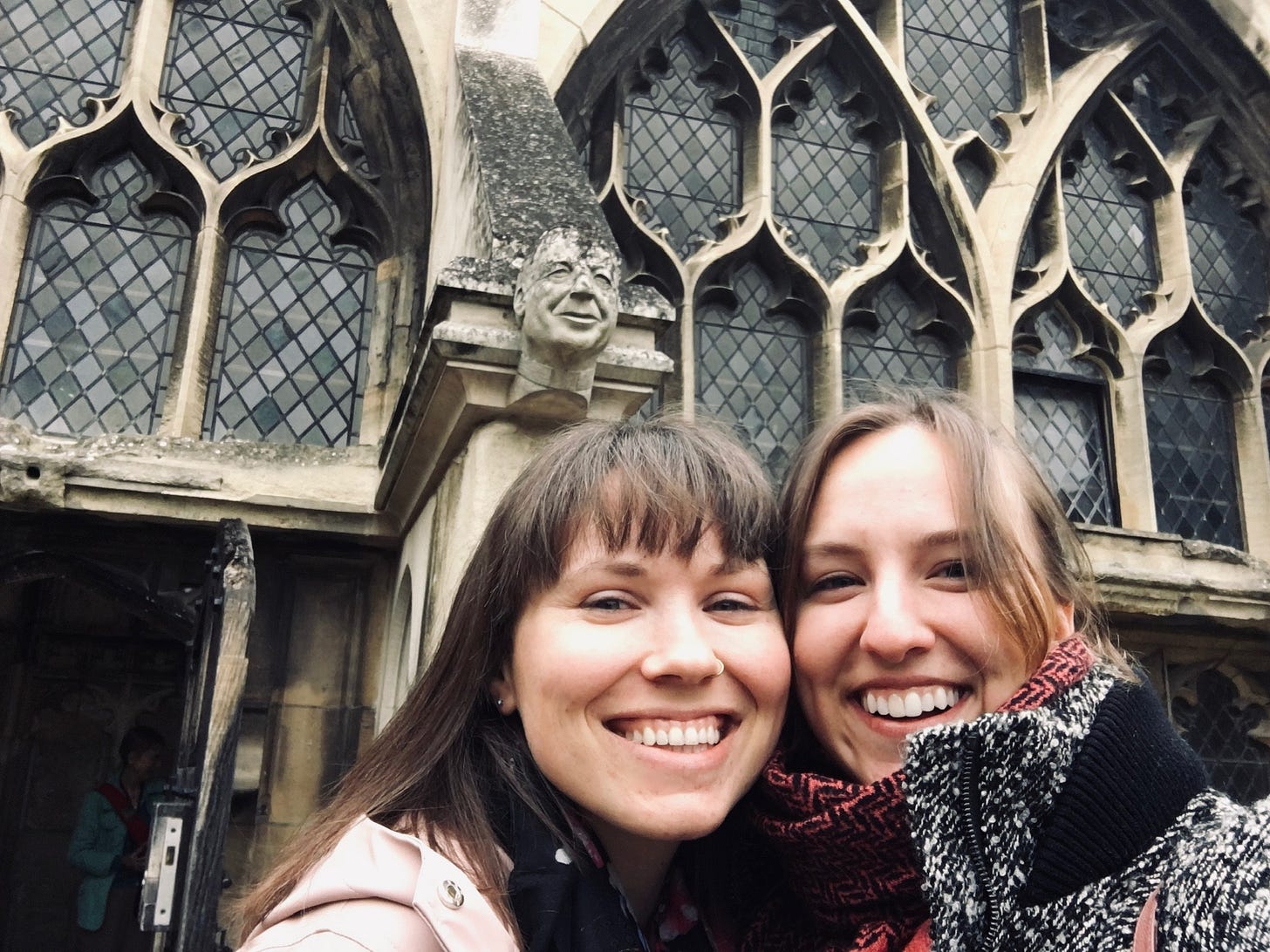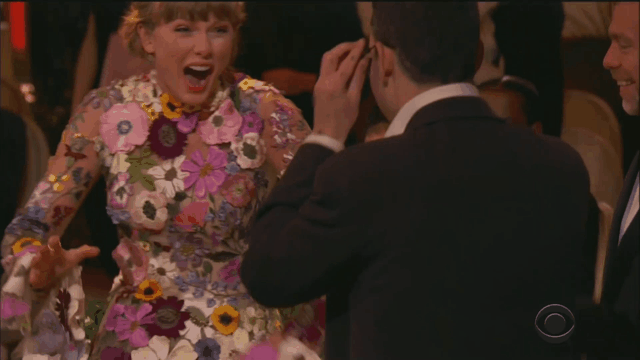Adulthood can't kill imagination, nor hope
Book Club: ATGIB Chs 27-35. Guest reflection by Hannah Marchant
Hello everyone, and how are you?
Today is my son’s last day of preschool in England, and he’s dressed up like a dinosaur. If you know him at all, you will know this is very on brand. As I sip my new ‘toast and jam’ tea (why yes, it is amazing, thank you for asking) and type, I can hear him roaring at his sister.
Today I’m so pleased to introduce you all to my sister, Hannah. She is married to my husband’s brother but I dropped the ‘in-law’ a long time ago. We actually first met at church camp when we were teenagers, and then had at least one class together during our undergrad, and over the years we’ve bonded over our shared experience of being married to a Platter brother (and love of travel, and gardening, and being Texan… but those are stories for another day).
True to character, Hannah very kindly said yes when I asked her to write this week’s prompt for our discussion. She is thoughtful and wise, playful and passionate, adventurous and steady. I really think you’ll love getting to know her through her reflections this week.
“Henny Gladdis died and this had something to do with it.”
Wow, so much has happened for Francie in this time of early adolescence! The turbulence in her life seems to match her own transformation (doesn’t it seem to be that way for us all?). While reading about Francie, I realized a few things that we must all face in our adolescence, which I believe this paragraph sums up beautifully:
“Between her eleventh and twelfth birthday, things changed. The future came along quicker; the days seemed shorter and the weeks seemed to have less days in them. Henny Gaddis died and this had something to do with it. Francie, who knew Mama was always right, found out that she was wrong once in a while. She discovered that some of the things she loved so much in her father were considered very comical to other people. The scales at the tea store did not shine so brightly any more and she found the bins were chipped and shabby-looking. Everything was changing. Francie was in a panic. Her world was slipping away from her and what would take its place? Still, what was different anyhow?”
As Francie starts her transition into adulthood, she - as we all must do - grieves the loss of childhood. For Francie, playing through hunger no longer acts as a salve, the superhero capes on her parents fade, what happens to her body and how she treats it is tied to societal and patriarchal pressures, and with loss of innocence and the gaining of knowledge comes responsibility. Her relationship to herself and others is changing continually in this time.
I wonder if you can think back to a time in your own adolescence where you can remember noticing this same shift? How did you feel during those possibly turbulent times? Did you feel like your experiences were unique or universal?
Francie is moving into a more “grey” time period, being developmentally able to process the further complexities of life. We see her continue to struggle with the “black-and-white” rules of her community’s ethical standards. You may have noticed there’s been a lot of defining up to this point - who is “bad” and who is “good”. The parents have always had an answer, and while that answer sometimes changed or melded to specific situations (in regards to Aunt Sissy specifically), we’re really starting to see the pragmatism of these definitions now. For an individual (or community) always on the line of insecurity, black-and-white standards keep you safe. For children, this dichotomy is even a part of their development. But when it comes to individual morality, the story may be different for many and the ethics of any given situation are harder to define.
When it came to Joanna, the neighborhood girl who had a baby out of wedlock, Katie directs her fear of communal shame towards Francie.
“If she’s a good girl at heart, she’ll learn from the pain and the shame and she won’t do it again. If she’s naturally bad, it won’t bother her the way people treat her.” [...] Suddenly she turned to Francie and said, “Let Joanna be a lesson to you.”
Reading about Joanna’s stoning was gutting. The young woman simply dared to take her infant on a walk around the neighborhood. The audacity of her to “tout her shame” was too much for the other women. Smith notes they were “acting on an instinct which was strong even in Christ’s day,” referring to one of the hopefully better-known stories of Jesus (John 7:53-8:111) upturning the ethical standards and penalties of the a very physical representation of shame by pointing to something greater: self-reflection, empathy, grace.
Francie’s frozen as she watches the mob attack Joanna and her baby. As she copes later with her guilt at standing by, her menarche begins. It seems Francie’s survival response is typically to freeze. This combined with the unmovable force that is puberty and a terrifying reminder of an unforgiving society ready to gobble her up, I bet she felt quite out of control of her life at that moment.
I think we all had moments as children and adolescents where we froze in the face of injustice or conflict, whether it was witnessing a bully at school, animal abuse, or violence between adults. If this was your experience, I hope you’re able to extend grace to your younger self. Survival is a strong instinct our mind & bodies use to keep us safe. As children, it’s the adults in our life who are responsible for our safety. But, as we’ve learned, parents aren’t superheroes, and they can’t in reality always be there (so parents, please extend yourselves some grace as well). That’s why aftercare is so important.
The term aftercare covers a wide range of treatments and activities, but in this case, I’m referring to the support given after trauma. When Francie is attacked in the stairwell by the murderous pedophile, Katie is able to stop the attack before further physical abuse takes place. Katie takes her to the safety of their home and listens to Francie recount what took place. Johnny comes home shortly and both parents tend to her, meeting her needs and acknowledging the significance of the event for Francie.
Disregarding the part where the doctor gives Francie a sedative and the cops tell her parents to say it was all a dream, it seems to me what turned this event away from becoming a significant traumatic imprint (or what a therapist friend of mine calls capital ‘T’ trauma) in her life was her parent’s ability to tend to her aftercare, albeit imperfect.
Can we also give Katie an A+ for sex education? In a community, time, and place where people weren’t given the words to define what was happening with their bodies, Katie “told her simply and plainly all that she herself knew. There were times in the telling when Katie had to use words which were considered dirty but she used them bravely and unflinchingly because she knew no other words.”
Francie’s becoming an adult, which happened earlier back then than it does these days! She’s starting her last year of school already (WHAT. She’s just a baby!). All of these life events seem to be wearing on her. “Henny Gladdis died and this had something to do with it.” And yet, adulthood can’t kill imagination, nor hope. Francie’s journal entry about the play she’d like to write filled up my heart. In one paragraph she recognizes the uphill battle and seemingly ineffable fate of most of the ladies in her life, and yet…I’ll let Francie tell you:
“I have a very beautiful idea. There will be a girl in a white dress and her hair hanging down her back and she will be Fate. Other girls will come out on the stage and tell what they want from Life and Fate will tell them what they’ll get. At the end a girl in a blue dress will spread out her arms and say, “Is life worth living then?” And there will be a chorus that says “yes.” Only it will all be in rhyme.”
I hope as you go through this next week (heck, all of your life), if you find yourself wanting to scream “Is it worth it?!”, you’ll hear the chorus return with “YES.” We’re in this together, my friends.
P.S. #womangoals: “Does that mean she expects me to be a woman soon? I hope so because I want to be my own boss and get my hair cut off if I feel like it.”
Extra Resources
About Child Trauma | The National Child Traumatic Stress Network
Parenting a Child Who Has Experienced Trauma | U.S. Department of Health and Human Services
Hannah has really given us so much to consider, hasn’t she? I really appreciate the grace she’s called us to in the midst of so much hardship. As we reflect on what may be some harder moments from our lives, I wonder if you can also recall what nurtured your sense of self, relationship with others and the world, and maybe even your relationship with God in those seasons of your life? Did you have any ‘aftercare’ that made a difference?
As ever, the comments are open for us to reflect and wonder together. Also, you can reply directly to this email if you want to share and receive support from me privately.
Speaking of grace, I appreciate the grace you’ve shown me during my big changes this summer and the subsequent adjustments that’ve been made in this space. We move two weeks from today, and my last day at my current job is this Friday. I’m hoping I’ll soon have more bandwidth to give this the attention I initially planned to do!
Hannah and I will both be in the comments this week, and we look forward to chatting with you there!
Love,
Janette x
In John 7:53-8:11, people bring a woman caught in adultery to Jesus (note: just the woman carries the burden of shame here, her partner is not named or shamed), intending to get their validation to start the stoning. Jesus’ response: “Let the one among you who is without sin be the first to throw a stone at her.”






I really appreciated Hannah’s reflections this week. Having met her on a few occasions, I knew she was a wonderful person, but I did not know she was also an articulate writer.
As I read these chapters, I was reminded how thankful I am to not be actively living through adolescence. So, many tough life lessons take place during this time. I think one of my most difficult times during adolescence was my senior year of high school. My dad decided we needed to transition away from Alaska where I had spent all of my high school years to that point. He was unaware of the vast differences in graduation requirements state to state here in the U.S. We moved to a town in Illinois and by the time you are a senior most kids have pretty well established their peers and especially here, we’re not interested in the new girl from Alaska. It was very lonely, and I was behind on various Illinois graduation requirements despite having taken a vigorous college prep course load my first three years. Additionally, we were living in a dirty, cheap apartment complex that smelled because that is what we could afford while my dad finished college (finally). All that to say, I was feeling pretty defeated, weary and lonely. However, during that time, my mom really became a true best friend. She did lots of small things to help fill the gaps I was experiencing. She encouraged me; she grieved with me. She transitioned from being just my mom to being a true friend when I needed one desperately.
I also appreciated Hannah’s reminder to give ourselves grace as parents. It is a regular theme that is spoken to me from friends who speak truth in my life. I so desperately want to parent perfectly and the reality is, that is just impossible. I am not a Pinterest mom or even a lot of times, a fun mom. But I hope that my kids see daily that I fight for their well being, and I am here for them. I hope I recognize and offer aftercare when they experience tough adolescent issues. I hope I make what matters to them important to me.
I agree 100% with Heather... Hannah, you sure have a way with words and reflections.
Janette, along with your help this week, sure is creating some great material for the internet (which could do with a bit of sprucing up).
"Can we also give Katie an A+ for sex education?" YES, WE CAN. I was so happy that Francie wasn't as lost as the other children in the neighborhood. It feels like a win amongst all the setbacks she faces.
I was cringing when the doctor told Francie's parents to tell her it was a just a dream. But, after reading your reflecitons about her parents' "aftercare", prior to the doctor's, I backtracked a bit. It's true. They listened. They removed the immediate fear she was experiencing (the 'dirty' part on her leg that became the 'burnt' part on her leg). I think that kind of reassurance, no matter how crazy the rationale is, was the most important thing at the time. Who knows, if her dad hadn't 'burned off the man's touch' it may have turned into a capital-T trauma as your friend calls it. Another win for Francie amongst all she has on her plate!